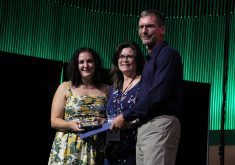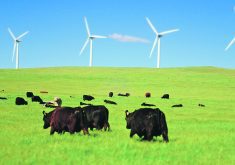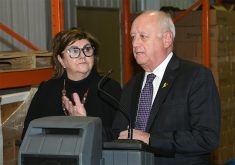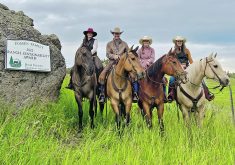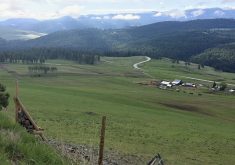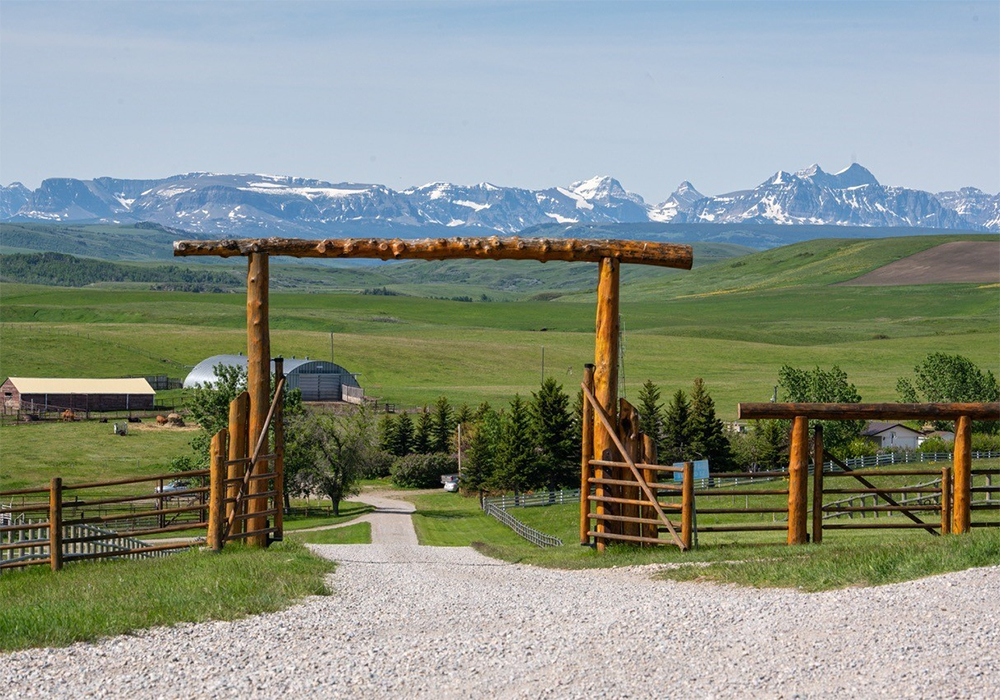Wray family receives Alberta Beef Producers’ Environmental Stewardship Award for work in environmental conservation
A member of an Alberta ranch family honoured with this year’s Environmental Stewardship Award said being disconnected from the land is causing a spiritual and an ecological crisis for humanity.
“I’ll never denigrate someone who’s just trying to get by, but for sure, our modern imagination has dislocated the mind and the soul from our bodies,” said Tim Wray of the Wray Ranch west of Irricana, Alta. He pointed to terms such as nature deficiency, which describe the unmet need of people to be in contact with the environment.
“And to live in a world where you think you can just make the world around you — you can just make yourself into whoever you want to be — I don’t buy it, and I’m sure it’s tied to many of the social and mental crises that we see; the fact that we are dislocated as human beings.”
Alberta Beef Producers announced the ranch had won the award July 10 at the second annual Alberta Beef Industry Stampede Summit in Calgary. The honour was accepted by Doug and Linda Wray, along with Tim and Joanne Wray.
“The root word, ‘environment,’ means surroundings,” said Tim in a speech at the summit. “Mental pertains to the mind — of our perceptions. It’s what we pay attention to. When we stop paying attention to our surroundings, they shrink and we become impoverished.”
Growing up on the ranch, Tim watched how the spring thaw moved through the pastures, and where the grass browned off on the hilltops in August but remained green in the bottoms, “and just paying attention to how things grow and move,” he said in an interview.
“And yes, home is where a person finds himself, and that’s my roots. It’s a fine privilege to be from a place, and that just happens to be the place I’m from and I cherish it.”
He welcomes the opportunity to be an integrated person in a landscape.
“And I don’t want to romanticize it, because there’s little romantic about moving an electric fence at minus 20 C,” he said.
“But I know where I belong and it connects me to something bigger than myself, and I would invite anybody to participate in that in any way they can, regardless of where they find themselves. We are embodied creatures, and that’s dignified, and we should honor that.”
Besides presenting the Wray family with a large gate sign detailing their ranch as the winner of the award, a further announcement was made at the summit by co-sponsors Ducks Unlimited Canada and the Nature Conservancy of Canada.
A grant of $10,000 will go to winners of the award through a grassland stewardship program offered by the Weston Family Foundation. The funding can be applied to an environmental stewardship project of the recipients’ choice, said Tom Lynch-Staunton, regional vice-president of the Nature Conservancy of Canada.
He said despite preservation efforts, ranches are being lost along with their grazing land, contributing to the loss of more than 100,000 acres of grassland per year across the Canadian Prairies, said Lynch-Staunton.
“So, anything that we can do to help support ranchers to continue ranching will not only help the economic drivers which make Alberta such a wonderful place to live, but also… provide a very tasty and nutritious food for us to eat, and at the same time, allowing for healthy landscapes which support biodiversity and wildlife, and all those critters that have those grasslands as home.”
Founded in 1910 about a 30-minute drive northeast of Calgary, the Wray Ranch for much of its existence was a mixed farm that contained annual cropland and some native pastures. However, it has focused on cattle and regenerative agriculture for the past 25 years, seeding 1,000 acres of cropland into high-legume perennial pastures in 1998.
Although formal calculations haven’t yet been made, the ranch may sequester more carbon than it emits from things such as transportation, “which I think for many people would totally surprise them because they all know that the beef cow burps and emits methane,” Doug Wray told reporters at the summit.
“But what they don’t consider is that she does that from just eating grass, which just took carbon dioxide out of the atmosphere, and those plants that they’re eating actually put one-third of the carbon they take out of the air and put it in their roots and store it in the soil,” he said.
“So, when you take that metric against the grazing side, you can come out with the potential to be a net positive on the environment while growing beef. Now, they can’t do it everywhere in the world, but Alberta may be one place where in fact that can work very well, so that’s a story that we think needs to be told.”
There is an increasing divide between urban and rural sensibilities, said Tim during the interview. “And what I experience when I come and visit my urban neighbours is that they don’t even think about where their food comes from because it’s a completely abstract notion, and that’s part of the disintegration that I think we all live with,” he said.
“And so, there’s no one way to be a human being, but I think we would gain as a society to somehow re-integrate that urban-rural divide and nurture a more robust landscape.”
Canada’s ongoing process of truth and reconciliation with the country’s First Nations people must be part of the solution, said Tim.
“It was an intellectual and spiritual crisis that got us to this point,” he said.
“It will not be a technocratic solution that solves the problem, and if I was to make my little political piece, the power I found in truth and reconciliation is the discovery that there is an entire culture of people who have not forgotten that they are part of the land. This truth might save us if we will listen.”
He told the audience at the summit that being treaty people “has something to do with stewarding that which does not belong to us… and environmental stewardship is a way of being in the world that anyone can aspire to and everyone can be enriched by when you realize that you don’t have to own it to be connected to it. Everything we see becomes a part of us.
“Thank you for seeing the beauty and wonder of our family’s ranch. We receive this award with humility and gratitude, for we are part of something far bigger than ourselves, and that includes you, too. We’re all richer for it.”






